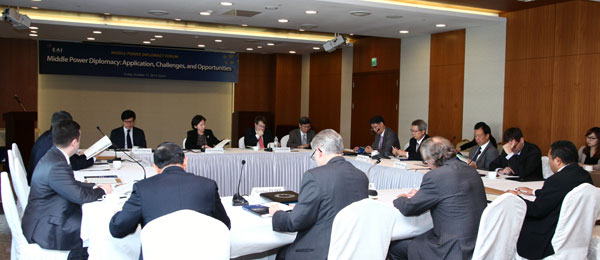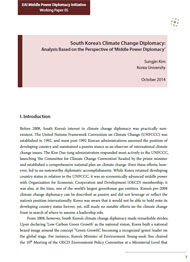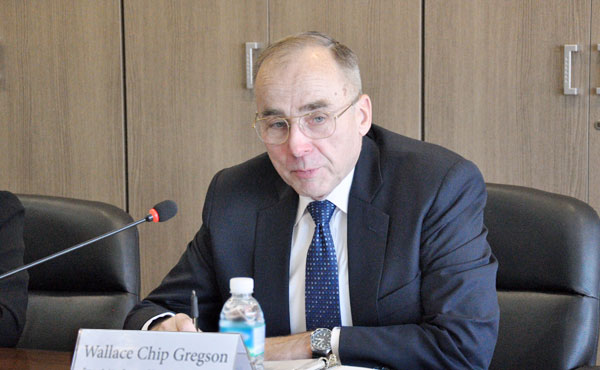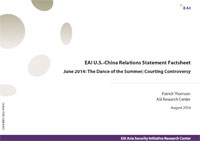 |
EAI Hosts the Middle Power Diplomacy Forum
 The EAI hosted the Middle Power Diplomacy Forum at Hotel Kukdo in Seoul on October 17th and 18th. The forum brought together experts on middle power diplomacy, from Korea and abroad, including Indonesia, Canada, the U.S., China, Singapore, Australia, Turkey and Mexico, as well as local embassy officials. Deep discussions were had over the definition of middle power diplomacy, its role in maritime disputes, finance, climate change, security architecture in the region, development cooperation, cyber security, smart power, ASEAN, U.S.-China relations, as well as U.S., Chinese and Canadian perspectives on middle power. Experts also engaged in discussions on the role and implications of middle power diplomacy toward the unification process on the Korean peninsula. The EAI hosted the Middle Power Diplomacy Forum at Hotel Kukdo in Seoul on October 17th and 18th. The forum brought together experts on middle power diplomacy, from Korea and abroad, including Indonesia, Canada, the U.S., China, Singapore, Australia, Turkey and Mexico, as well as local embassy officials. Deep discussions were had over the definition of middle power diplomacy, its role in maritime disputes, finance, climate change, security architecture in the region, development cooperation, cyber security, smart power, ASEAN, U.S.-China relations, as well as U.S., Chinese and Canadian perspectives on middle power. Experts also engaged in discussions on the role and implications of middle power diplomacy toward the unification process on the Korean peninsula. 
|
EAI Middle Power Diplomacy Initiative Working Papers 4, 5, 6 Available Now
 The EAI Middle Power Diplomacy Initiative Working Paper Series published three papers in October. The first by Sangbae Kim titled "The Inter-network Politics of Cyber Security and Middle Power Diplomacy: A Korean Perspective," advances brokerage diplomacy, collective diplomacy and complementary diplomacy as middle power strategies that can be used in this issue area. Moreover Kim argues that Korea in this context cannot be a system designer, rather can function as a complementary programmer and planner. Sungjin Kim's paper titled: "South Korea's Climate Change Diplomacy: Analysis Based on the Perspective of 'Middle Power Diplomacy'," claims that Korea was successful in implementing middle power strategies during climate change dialogues, functioning as an 'early mover', 'bridge', 'coalition coordinator' and a 'norm diffuser.' In the third paper published this month, Seungjoo Lee argues that in the area of development cooperation Korea has moved from 'fast follower' to development cooperation 'developer'. His paper titled "Multilayered World Order and South Korea’s Middle Power Diplomacy: The Case of Development Cooperation Policy," positively assesses Korea's efforts to help incorporate emerging donors in development cooperation governance regimes, thus helping to propagate a new norm. All three papers are available for download at the EAI website. The EAI Middle Power Diplomacy Initiative Working Paper Series published three papers in October. The first by Sangbae Kim titled "The Inter-network Politics of Cyber Security and Middle Power Diplomacy: A Korean Perspective," advances brokerage diplomacy, collective diplomacy and complementary diplomacy as middle power strategies that can be used in this issue area. Moreover Kim argues that Korea in this context cannot be a system designer, rather can function as a complementary programmer and planner. Sungjin Kim's paper titled: "South Korea's Climate Change Diplomacy: Analysis Based on the Perspective of 'Middle Power Diplomacy'," claims that Korea was successful in implementing middle power strategies during climate change dialogues, functioning as an 'early mover', 'bridge', 'coalition coordinator' and a 'norm diffuser.' In the third paper published this month, Seungjoo Lee argues that in the area of development cooperation Korea has moved from 'fast follower' to development cooperation 'developer'. His paper titled "Multilayered World Order and South Korea’s Middle Power Diplomacy: The Case of Development Cooperation Policy," positively assesses Korea's efforts to help incorporate emerging donors in development cooperation governance regimes, thus helping to propagate a new norm. All three papers are available for download at the EAI website.  |
Smart Talk with Wallace Chip Gregson
 Under the theme of "The U.S. Presence in Asia," on Wednesday October 15th, EAI hosted a Smart Talk session with former Assistant Secretary of the U.S. Department of Defense, Asian and Pacific Security Affairs, Wallace Chip Gregson. Moderated by Sook-Jong Lee, President of EAI, the discussants included Professor Bong Jun Ko (Chungnam National University), Professor Ho Yeol Yoo (Korea University), Professor Seungjoo Lee (Chung-Ang University), Professor Chaesung Chun, Chair of the EAI’s Asia Security Initiative Research Center (Seoul National University), and Professor Ji Hwan Hwang (University of Seoul). Discussions related specifically to the misconceptions associated with the U.S. 'pivot' or 're-balance' to Asia, the U.S. realignment of forces in South Korea and the U.S. perspective on issues facing the Northeast Asia security architecture. Under the theme of "The U.S. Presence in Asia," on Wednesday October 15th, EAI hosted a Smart Talk session with former Assistant Secretary of the U.S. Department of Defense, Asian and Pacific Security Affairs, Wallace Chip Gregson. Moderated by Sook-Jong Lee, President of EAI, the discussants included Professor Bong Jun Ko (Chungnam National University), Professor Ho Yeol Yoo (Korea University), Professor Seungjoo Lee (Chung-Ang University), Professor Chaesung Chun, Chair of the EAI’s Asia Security Initiative Research Center (Seoul National University), and Professor Ji Hwan Hwang (University of Seoul). Discussions related specifically to the misconceptions associated with the U.S. 'pivot' or 're-balance' to Asia, the U.S. realignment of forces in South Korea and the U.S. perspective on issues facing the Northeast Asia security architecture. 
|
The UCR September Edition Titled: Fire and Ice? Differing Responses to the Geopolitics of the Fall
 As the crisis in the Middle East continues to command the world's attention, differences in the responses between the U.S. which favor an individual interventionist response and China, who favors a more multilateral response is particularly noteworthy. Also tracked in this month's factsheet is the unrest in Hong Kong, celebrating 35 years of U.S.-China bilateral relations, the NATO summit in Wales, U.S. criticism of Russia in Ukraine, Chinese insistence on non-interference in its domestic matters and a shared drive toward combating climate change. Rounding out the issue this month are statements on the Korean peninsula, restarting six party talks, growing trade networks and the U.S. pressing Taiwan to tighten copyright laws to enhance cooperation. As the crisis in the Middle East continues to command the world's attention, differences in the responses between the U.S. which favor an individual interventionist response and China, who favors a more multilateral response is particularly noteworthy. Also tracked in this month's factsheet is the unrest in Hong Kong, celebrating 35 years of U.S.-China bilateral relations, the NATO summit in Wales, U.S. criticism of Russia in Ukraine, Chinese insistence on non-interference in its domestic matters and a shared drive toward combating climate change. Rounding out the issue this month are statements on the Korean peninsula, restarting six party talks, growing trade networks and the U.S. pressing Taiwan to tighten copyright laws to enhance cooperation.  |
Upcoming Event: EAI to Host International Conference on Empowering Community of Democracies
The EAI is to host the international conference titled "Empowering Community of Democracies," on November 24th and 25th, supported by the Ministry of Foreign Affairs, and in collaboration with the Asia Democracy Network. This conference will address issues affecting different countries in Asia such as freedom of opinion and expression, education for democracy, elections, enabling and protecting civil society, judicial review and transparency. Many distinguished civil society experts and leaders are expected to attend, including Maria Leissner, Secretary-General of the Community of Democracies, Carl Gershman, President of the National Endowment for Democracy, Roland Rich, former Executive Head of The United Nations Democracy Fund, John Sullivan, the Executive Director of the Center for International Private Enterprise and Jerzy Pomianowski, the Executive Director of the European Endowment for Democracy. This forum is an important stepping stone in the formulation of the proposed agenda for the 8th Ministerial Conference of the Community of Democracies to be held in El Salvador in 2015.
|
Upcoming Event: KF-EAI Korea Friendship Gala
The EAI will host the KF-EAI Korea Friendship Gala on Thursday 27th of November. Supported by the Korea Foundation, the gala is the Korea Friendship (KF) Program's final event of the year. The KF-EAI Korea Friendship Program consists of 3 parts; the KF Academicus, comprising of an 8-part lecture series on Korean culture and contemporary society; the KF Communicus, an essay contest and conference in relation to topics covered in the lecture series; and the KF Empathicus, where participants are able to network with various groups within Korean society including fellow students, academics and those involved in the realm of public diplomacy. The gala will also include a graduation ceremony for students who have successfully completed the program and it is expected to be attended by more than 100 participants.
|
#909 Sampoong B/D, Eulji-ro 158, Jung-gu, Seoul 100-786, Republic of Korea
Tel 82 2 2277 1683 | Fax 82 2 2277 1684/1697 | Email EAI | Unsubscribe
Copyright 2014© EAST ASIA INSTITUTE. All Rights Reserved. | |

